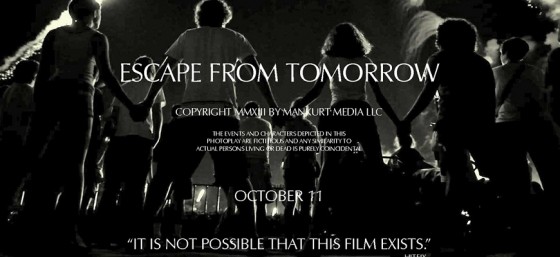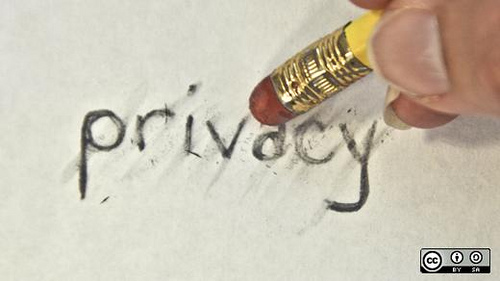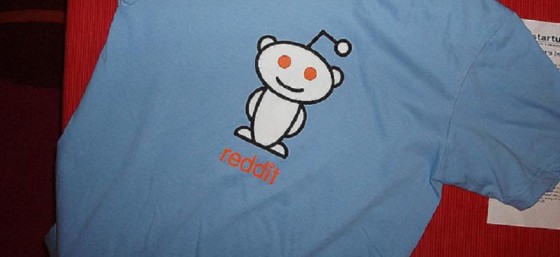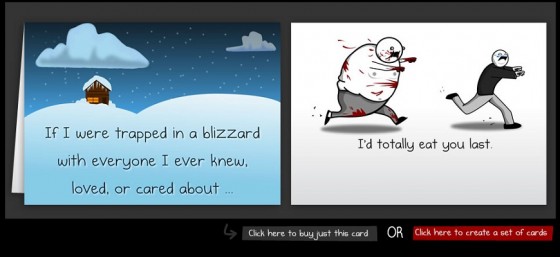
This is one of the most innovative projects I’ve heard about this year – Escape from Tomorrow – a film that was mostly shot at Disneyland and Walt Disney World without Disney’s knowledge. The cast and crew blended in with other park patrons by storing their scripts and communicating via their phones, using video cameras that were the same type that regular park-goers use, and they used natural lighting. Besides the fact that the cast wore the same outfits every day and they had to go on the same rides over and over again to get the shots, no one could tell they were up to something.
Escape from Tomorrow was written and directed by Randy Moore and it premiered at the 2013 Sundance Film Festival. The fact that the film was shot at Disney parks was kept under wraps until the premier and then it got a lot of attention from reviewers, many of which expected Disney to try to prevent the film from being shown during and after the festival. Disney has acknowledged that the film exists but hasn’t taken action against it yet. Escape from Tomorrow will be available in theaters starting October 11th.
I’m excited to see the film, not for the story itself, but to examine the legal arguments that Disney may have against the film.
What about Intellectual Property Infringement?
The general rule is “Don’t fuck with Disney” because they’re known for laying the smack down on anyone who uses their intellectual property without permission. Moore reportedly was diligent about removing excerpts from Disney movies and songs that were caught on film. Disney won’t likely try to claim copyright in everything it owns inside its parks and even if they did, Moore has a strong fair use argument.
Disney probably wouldn’t win on a trademark claim either, even though I’m sure Disney trademarks appear in the film. I bet Moore’s lawyers would make an argument that the film’s use of Disney is like Thomas Forsythe’s use of Barbie dolls in his work. Mattel lost the case against Forsythe because he couldn’t make the same artistic statement without using the iconic dolls. Tim Wu, professor at Columbia Law School also brought up the argument that no one would see this film and think that Disney was involved in it.
Shouldn’t this be a Non-Issue since Disney lets Visitors Shoot Photos and Videos in its Parks?
Of course Disney lets visitors take photos and videos inside the parks. It’s basically a form of free advertising for them. And even if they didn’t like it, they would have accepted that there’s nothing they could do to stop the hordes of people who visit every day from snapping photos or making home movies. This has become even more prolific now that everyone has a smartphone.
The issue isn’t that they were shooting video, but that they were shooting video for a commercial purpose. Disney parks are private property and they can require people to pay for a location release to use their property. I suspect their lawyers have contract templates ready and a fee structure for anyone who approaches them about shooting a movie at a park.
This gets into a gray area when people go to Disney for personal/recreational purposes, shoot videos, and then post them on YouTube. If the patron monetizes their videos and they get enough hits, they could make money off of their Disney experience. I suspect the amount in question would be too low for Disney to care, but it raises the question of how much financial success can you have via YouTube before you have to worry about legal repercussions.
What about People in the Background?
Moore and his people didn’t get releases from anyone who was caught in the background of any of his shots. He might be accused commercializing their images without their consent if he doesn’t blur them out. I wonder if there are enough pissed off people who were caught on film that they would pursue a class action against Moore.
If I heard that Moore was filming at a Disney park the same time I was there, I’d be running to the theatre to see it, hoping that I made it in the background. I suspect some people would be excited to be on it and may only ask to be listed in the credits for posterity if possible.
It’s uncharacteristic of Disney not to respond to a potential legal fight. On one hand I wonder if they’re waiting to see if the film will be a commercial success before deciding if they’re going to pursue it because there’s often no point in winning a lawsuit (besides pride) against someone who can’t pay up. Alternatively, Disney may be ignoring the film out of fear that if they respond that it will lead to more attention, and more people will see the film, and Moore will make more money.
You can connect with me on Twitter, Google+, Facebook, YouTube, LinkedIn, or you can email me.
You can also subscribe to the Carter Law Firm newsletter.
Please visit my homepage for more information about Carter Law Firm.










